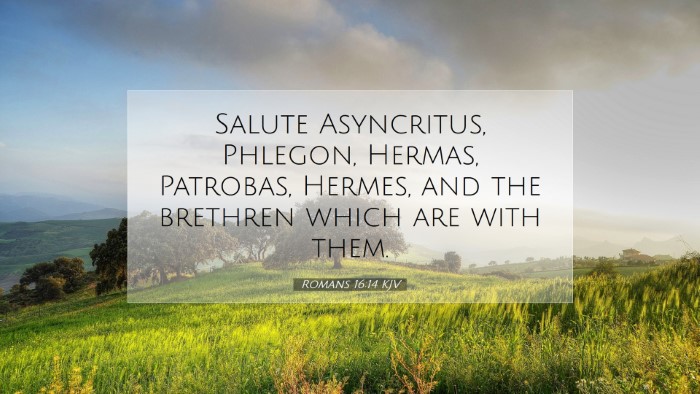Commentary on Romans 16:14
The verse Romans 16:14 reads:
"Greet Asyncritus, Phlegon, Hermas, Patrobas, Hermes, and the brethren who are with them."
Preamble
This segment of the Apostle Paul's epistle to the Romans is often overlooked, yet it holds profound significance in understanding the early Church and the relationships among its members. It showcases the importance of community and fellowship within the body of Christ.
Insights from Matthew Henry
Personal Connections: Matthew Henry highlights that these greetings emphasize the personal relationships within the Christian community. Each named individual represents a testament to the connections formed through the faith. Henry notes that these names may be unfamiliar to many, yet they reflect the diverse fabric of the early church, extending across various backgrounds and social standings.
Recognition of Labor: Furthermore, Henry observes that acknowledging these individuals serves as an exhortation for believers to honor those who labor for the Gospel. Paul’s personal greetings underscore the value of every member of the church, suggesting that every contribution is significant in the sight of God.
Insights from Albert Barnes
Historical Context: Albert Barnes provides a historical perspective on each individual mentioned. He explains that these names were likely common in the first-century Roman context, illustrating the blend of cultures—Greeks, Romans, and Jews—within the early Church. This diversity, Barnes argues, serves as a model for contemporary congregations to embrace inclusivity and unity amidst diversity.
Role of Brethren: Barnes also emphasizes the mention of "the brethren who are with them." This phrase suggests a collective effort within the community, reminding the Church today of the power of unity in purpose and mission. The spirit of cooperation is essential in fulfilling the Great Commission, which calls for believers to spread the Gospel collectively.
Insights from Adam Clarke
A Call to Acknowledge Contributions: According to Adam Clarke, the names listed signify those who were perhaps leaders or influential figures in the early church community. He argues that Paul does not merely offer greetings but also validates the contributions of each person mentioned. This underscores the necessity for Christians today to recognize the roles of both visible and less visible members of their communities.
Encouragement to Persevere: Clarke points out that the greetings also serve as an encouragement to persevere in faith and labor. Each individual mentioned may have faced different challenges in their walk with Christ; however, Paul’s acknowledgment acts as a beacon of hope and a reminder of God’s faithfulness through community support.
Theological Reflections
Across these commentaries, certain theological themes emerge that can deepen our understanding of Roman 16:14:
- Value of Community: The consistent emphasis on relationships underscores that Christianity is not a solitary faith but a communal one. The body of Christ thrives when its members actively engage with one another, fostering connections that advance the mission of the church.
- Inclusivity of the Gospel: It is noteworthy that Paul addresses individuals from various backgrounds, reflecting the inclusive nature of the Gospel itself. This serves as a lesson that God’s message transcends cultural and social barriers.
- Honor and Recognition: The act of greeting serves a dual purpose: it honors those who may not have been in the spotlight and encourages the larger community. This practice can inspire modern churches to implement similar acoustic acknowledgments, fostering a culture of appreciation.
Practical Applications
From understanding these biblical insights, several practical applications can be drawn:
- Encourage Relationships: Pastors and leaders should strive to cultivate strong personal relationships within their congregations, acknowledging the contributions of all members.
- Foster Inclusivity: Churches are called to embrace diversity and ensure that everyone feels welcome and valued, mirroring the early church's embrace of different backgrounds.
- Recognize Efforts: Regularly acknowledge and celebrate the efforts of those serving in various capacities, whether visible or behind the scenes, to foster community spirit.
Conclusion
In conclusion, Romans 16:14 serves as more than a mere list of names; it is a powerful reminder of the beauty and diversity of the body of Christ. The insights from Henry, Barnes, and Clarke illuminate the relational fabric that undergirded the early church and provide inspiration for contemporary believers to articulate and embody their faith in community. Through the recognition of roles, fostering inclusivity, and encouraging relationships, the church today can become a vibrant expression of Christ’s love and mission in the world.


